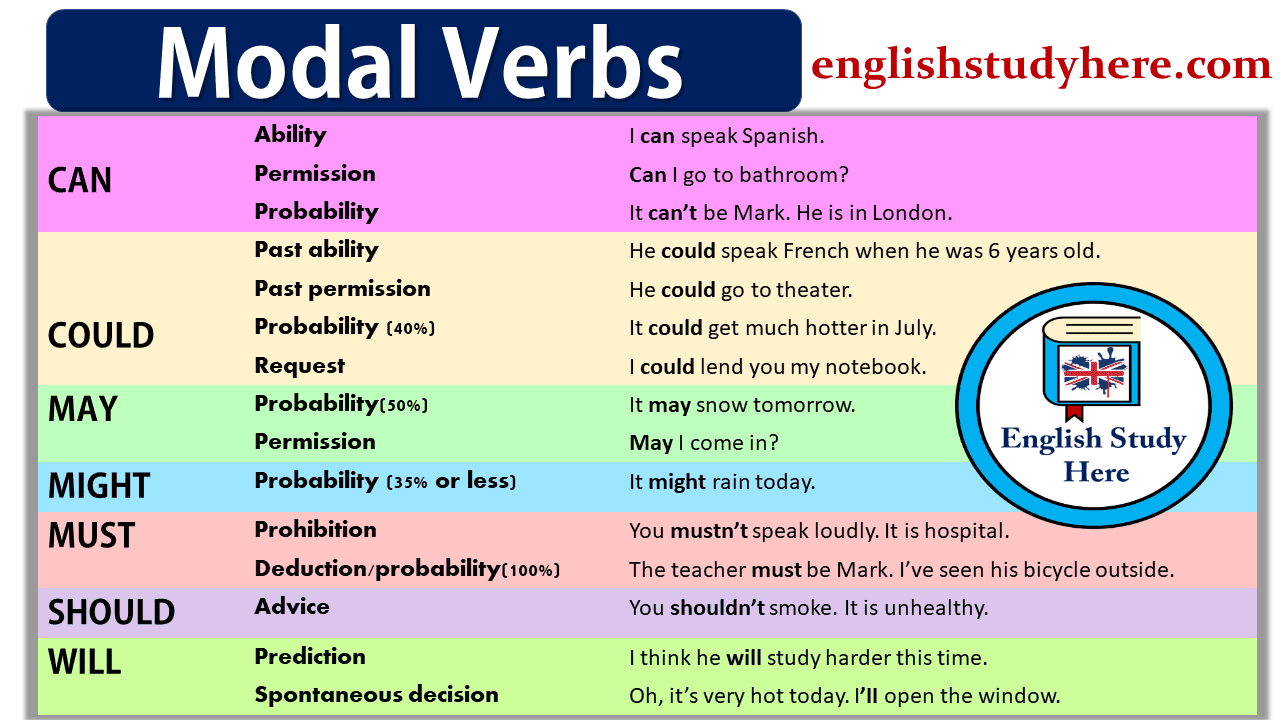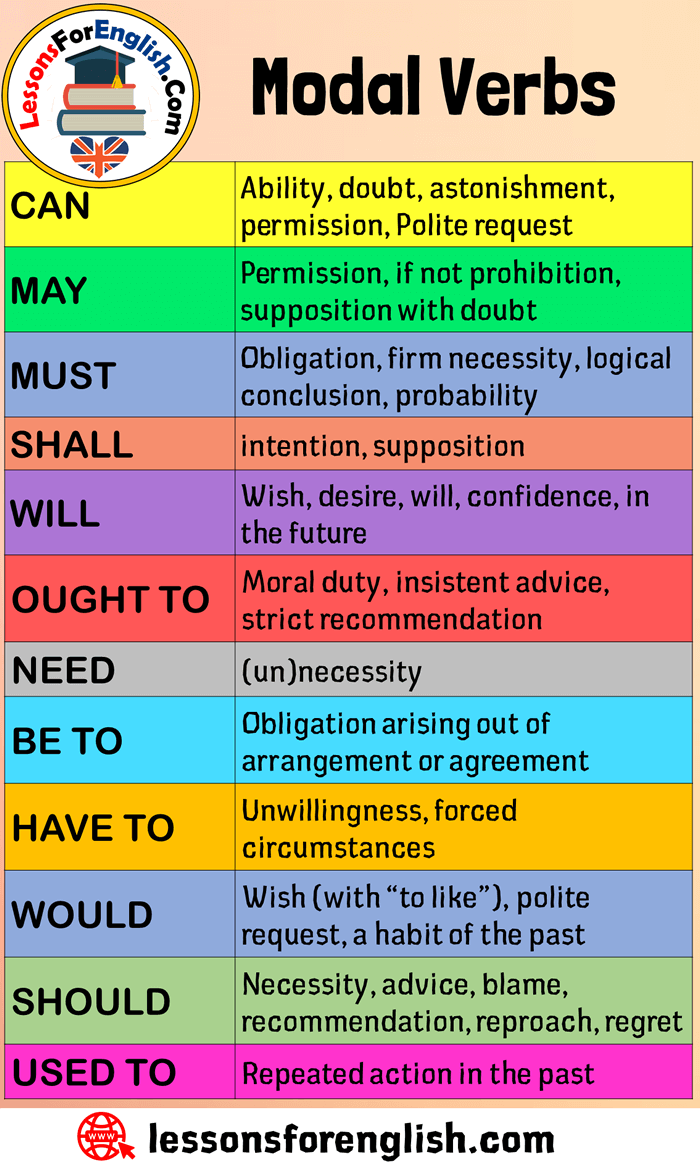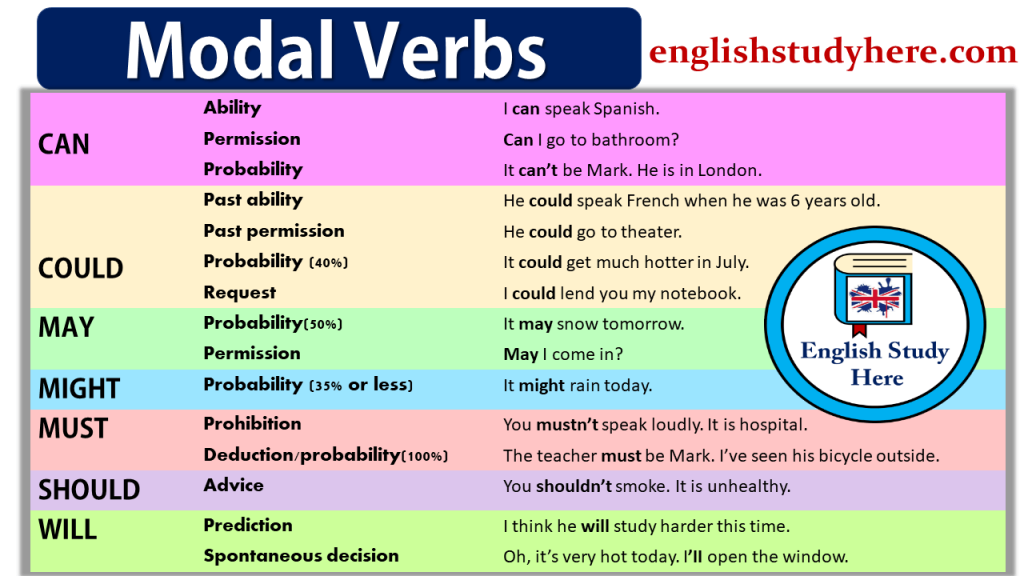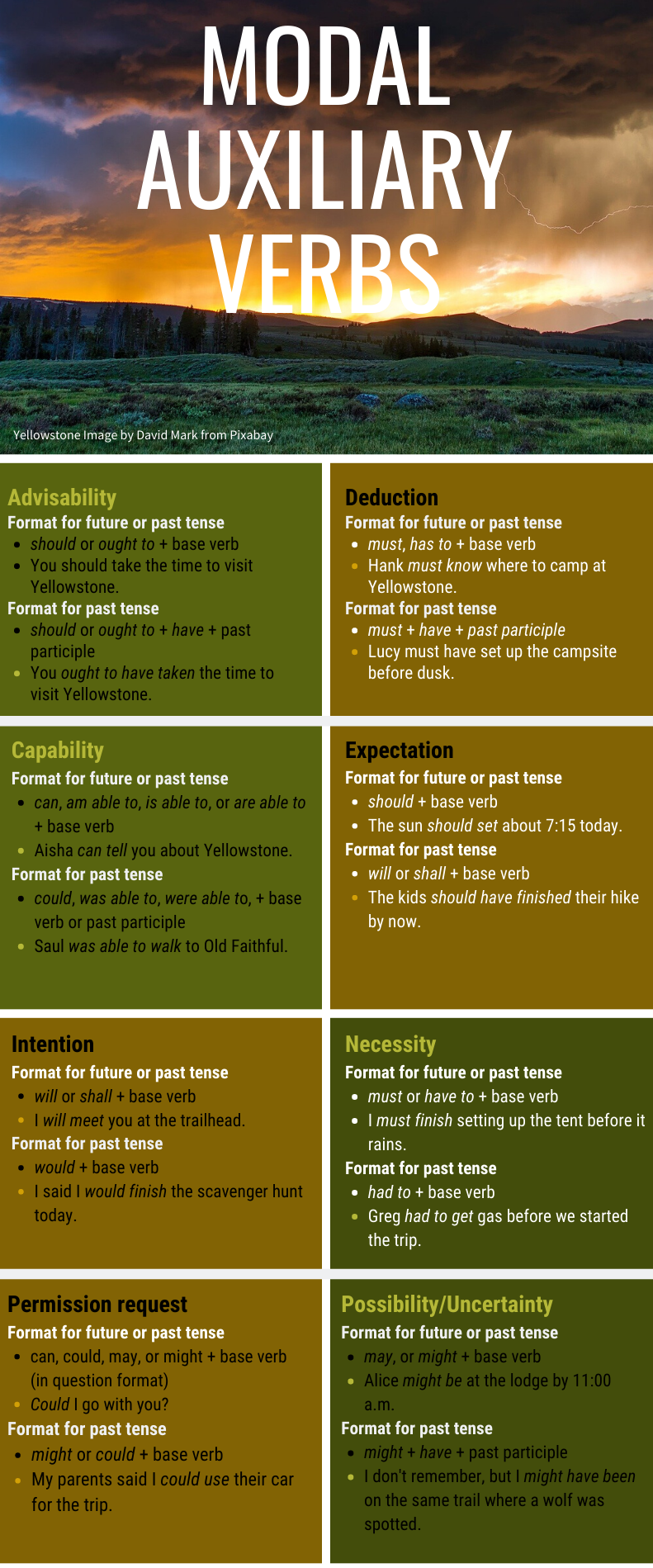An auxiliary verb is a verb that provides grammatical or useful intending to the clause wherein it really is used. Auxiliary verbs are often used in conjunction with a verb. They should be utilized to precise aspect, voice, modality, tense etc. The foremost verb is significant because it really is used to offer the clause's semantic content. A straightforward expression, for example, could be to say, "I have completed scripting this article".
Here the verb is writing and the auxiliary verb could be 'have', which helps to precise the right aspect. There could be two or extra auxiliary verbs as nicely in a sentence. If you've heard or encounter the phrases 'helping verbs' then they're precisely what auxiliary verbs are! Modal verbs additionally fall within the class of auxiliary verbs.
They are particularly used to point the modality in a clause. Modality right here refers back to the ability, likelihood, permission or the duty of the efficiency of the verb with which it can be used. Some examples incorporate the verbs can/could, shall/should, may/might, need to etc. They are referred to as modal verbs as they present the probability of a selected action. To use 'could' would imply the power to carry out a activity with an possibility even if to carry out or not.
However, if 'could' is changed by 'should' then the duty at hand needs to be carried out whatever the power to carry out it. This instance hopefully makes you realise what modal verbs are. In English and different Germanic languages, modal verbs are exclusive within the sense that they've specific grammatical properties. It have to be famous right here that each one modal verbs are auxiliary verbs however not all auxiliary verbs are modal verbs. Have to and have gotten to interrupt all the principles that pure modal auxiliary verbs follow.
They incorporate multiple word, they use infinitive sorts of the principle verbs, the auxiliary verb do is used for negatives and questions , and so they conjugate for the third-person singular. Despite all of those differences, these semi-modal auxiliary verbs have a number of modal meanings. Modal auxiliary verbs, additionally frequently often called modal verbs or modals, are used to shift the which means of the principle verb in a clause. These shifts incorporate expressing possibility, ability, permission, obligation, or future intention.
Students can discover these complicated since one modal auxiliary verb can have a number of meanings counting on the context. All modal auxiliary verbs are observed by a foremost verb in its base type ; they could in no way be observed by different modal verbs, lone auxiliary verbs, or nouns. Like different auxiliary verbs, modal verbs work in conjunction with a foremost verb to provide a unique intending to a sentence/clause than if the principle verb was utilized by itself.
Modal auxiliary verbs are used to point out a necessity, capability, willingness, or possibility. Unlike most verbs, there's just one sort of those verbs. Typically, verb varieties change to point even if or not the sentence's construction is singular or plural. Most verbs additionally point out even if or not a factor occurred within the past, present, or future. This is just not the case with most modal auxiliary verbs, which makes them easier to know and use correctly.
What Is Modal Verb In Grammar Modals/ modal verbs/ modal auxiliary verbs are a amazing variety of verbs current in English grammar. These verbs are used irregularly in English grammar. Uses of modal verbs in English grammar comprises offering additional details concerning the motion of the principle verb. The semi-modal auxiliary verb must ends in to, which makes the principle verb an infinitive. This differs from pure-modal auxiliary verbs, which use the naked infinitive, the infinitive with out to, for the principle verb.
The which means of have to is almost similar to have to in all cases. When forming questions or negatives, have to is extra frequently used than ought to. Modal auxiliary verbs are used to uniquely shift the which means of the principle verb they modify, expressing issues corresponding to possibility, likelihood, ability, permission, obligation, or intention. As we'll see, how and once we use modal verbs enormously impacts the which means of our writing and speech. Modal verbs are auxiliary verbs (also often recognized as "helping verbs"). Normally modal verbs can not work alone and have to work with a fundamental verb.
The so-called "semi-modals" work partly like modals and partly like most important verbs. I'd wager you employ auxiliary verbs and modal auxiliary verbs with no giving them a second thought, so I'm aware that this web page has lined plenty of gumpf that you simply do not honestly need. Well, that is true furnished we're speaking about working in English. If you begin mastering a overseas language, it will not be too lengthy earlier than you will be unpicking how they exhibit tense, voice and mood.
And, have you learnt what's an exceptional begin line for that? Moving on to the modal auxiliaries, probably the most typical ones are will, would, shall, should, can, could, may, might, and must. Modal auxiliary verbs are defective—yes, that's the real term, defective.
For example, they don't have third-person singular current tense forms—or to place it extra plainly, sentences like he cans, she mays, and it woulds are ungrammatical. They additionally don't have infinitive forms, so while it will make sense, a sentence resembling They look to need to perform extra is ungrammatical. In English, primary verbs however not modal verbs all the time require the auxiliary verb do to type negations and questions, and do will be utilized with primary verbs to type emphatic affirmative statements. (Neither negations nor questions in early modern day English used to require do.) Since modal verbs are auxiliary verbs as is do, in questions and negations they look within the phrase order similar to do.
Modal Auxiliaries are types of auxiliary verbs or supporting verbs. But they're distinct from conventional or typical auxiliary verbs for some reasons. The fundamental big difference between modal auxiliaries and customary auxiliaries is modal auxiliaries aren't modified their fundamental form. In contrast, typical auxiliaries may be modified their fundamental kind in accordance with using tenses. As a modal auxiliary verb, will is especially versatile, having a number of distinct features and meanings. It is used to kind future tenses, to precise willingness or ability, to make requests or offers, to finish conditional sentences, to precise probability within the quick present, or to concern commands.
Modal auxiliary verbs mix with different verbs to precise recommendations resembling necessity, possibility, intention, and ability. In every instance below, the verb phrase is in daring and the modal auxiliary verb is highlighted. These auxiliaries specific obligation, possibilities, permission or means in a sentence by including intending to the primary verb. As per modal verbs rules, the spelling or type don't change, in contrast to different verbs.
See the part on Conditional Verb Forms for assist with the modal auxiliary would. The shades of which means amongst modal auxiliaries are multifarious and complex. Most English-as-a-Second-Language textbooks will comprise at the very least one chapter on their usage. For extra superior students, A University Grammar of English, by Randolph Quirk and Sidney Greenbaum, incorporates an excellent, huge evaluation of modal auxiliaries. When used with the primary verb, modal verbs don't finish with -s for the third-person singular. Modal auxiliary verbs by no means change form, however they've a unique type for previous tense.
Modal verbs, which can exhibit such notions as likelihood ("may," "might," "can," "could") or necessity ("must"). Have to is usually grouped with modal auxiliary verbs for convenience, however in actual reality it isn't a modal verb. In many Germanic languages, the modal verbs might also be utilized in additional features than in English.
In German, for instance, modals can show up as non-finite verbs, which suggests they are often subordinate to different verbs in verb catenae; they needn't seem because the clause root. In Swedish, some modal verbs have infinitive forms. This as an illustration permits catenae containing a number of modal auxiliaries. The modal verbs are underlined within the next table. Semi-modal auxiliary verbs like ought to, had better, have to, give you the chance to, used to, and be purported to can have modal meanings, however they don't comply with the identical regulations as pure modal auxiliary verbs. Modals can have a number of meanings, ambiguous readings and may even overlap with one another to intend the identical factor in speech.
Take the notorious grammar rule thatcan I is for asking about capability whereas could I is for asking permission. In customary apply the 2 overlap and could imply the identical thing. This can surely add to the overall uncertainty and weak spot that utterances with modal verbs are acquired than these without.
Auxiliary, in grammar, a supporting element, generally a verb, that provides intending to the essential which means of the principle verb in a clause. Auxiliaries can convey details about tense, mood, person, and number. An auxiliary verb happens with a predominant verb that's within the shape of an infinitive or a participle. The verbs/expressions dare, ought to, had better, and needn't behave like modal auxiliaries to an outsized extent, despite the fact that they don't look to be productive within the position to the identical extent as these listed here. Furthermore, there are many different verbs that may be seen as modal verbs insofar as they clearly show modality within the identical method that the verbs on this listing do, e.g. appear, have to, look etc.
In the strict sense, though, these different verbs don't qualify as modal verbs in English due to the reality that they don't enable subject-auxiliary inversion, nor do they permit negation with not. If, however, one defines modal verb solely when it comes to which means contribution, then these different verbs would even be modals and so the record right here must be significantly expanded. Modal verbs are component to the bigger class referred to as auxiliary verbs that are verbs that can't be used on their own. Sometimes modal verbs are referred to as modal auxiliaries. The proven reality that modals haven't any inflected types within the current tense make them helpful for non-native audio system who typically expertise difficulties with Subject-Verb agreement.
Since modal auxiliary verbs would not have a previous tense form, we will use the modal auxiliary together with the phrase 'have' and a previous participle. Past participles routinely finish in -d, -ed, -n, or -en, creating the previous tense 'wished, looked, taken,' and so forth. Let's check out an instance within the current tense. Modal auxiliary verbs like can, may, ought, shall, and wooden are used to counsel an impending or attainable upcoming action. Learn to establish modal auxiliary verbs, fully grasp their purpose, and point out previous tense with the furnished examples.
The 9 modal verbs outlined above are totally different from different verbs in that they certainly not change forms. Even when obeying subject-verb-agreement, these verbs could be similar when used with singular or plural topics as in Cheetahs can run rapid and a cheetah can run fast. In addition to this, these verbs traditionally are used solely with selected verb tenses. For example, you're more more probably to listen to the sentence It is perhaps cloudy tomorrow however are unlikely to listen to the sentence It could may well be cloudy tomorrow.
Generally speaking, these modal verbs are most frequently used with verbs within the current tenses . You may need discovered that auxiliary verbs are referred to as "helping verbs." Modal verbs are a selected variety of auxiliary verb. They are used to indicate permission, obligation, ability, or possibility.
The interpersonal point of how we use issues like oblique speech acts, hedges, and modal verbs in some methods is extra valuable than the literal lexical which means itself. Crucially, modals and different hedges and oblique speech are generally utilized by all of usto point out a type of cooperative politeness and decrease face threatening acts . Scientists extra and extra understand, possibly in a approach that the general public doesn't yet, that utilizing hedging language is usually essential to rigorously convey extra actual levels of certainty. This doesn't mean, however, that their findings ought to be dismissed as not authoritative.
That makes it possible for for students to be extra collegial and circumspect in presenting work, which can regularly problem and select aside the prior work of colleagues. Modal verbs utilized in hedging open up debate, and permit researchers to be extra measured concerning the true certainty of their findings and conjectures, as few issues in science are 100% absolute. But applying them can have an outsized influence on how facts is acquired by others, and subsequently even how we decide the speaker, their credibility and competence, with no in reality altering the content material itself.
Rather than being well-behaved classroom screens assisting the primary verbs of a sentence, they're if truth be told linguistic rebels with an mind-set problem. Similarly, we can not use modal verbs with major verbs which are in a past-tense form; the verb that follows a modal should be in its base type . Instead, we both use sure modal verbs which have past-tense meanings of their own, or auxiliary ought to create a development that has a selected past-tense meaning. The modal auxiliary verb would has a wide range of features and uses.
It is used instead of will for issues that occurred or all started within the past, and, like shall, it can be probably used instead of will to create extra formal or well mannered sentences. It can additionally be used to precise requests and preferences, to explain hypothetical situations, and to politely supply or ask for information or an opinion. Another approach by which modal auxiliaries differ from lexical verbs is that their previous tense types probably don't present previous time. In fact, you would possibly not have even realized that some modal verbs are literally past-tense forms. I didn't, till I all started taking an curiosity in grammar. Will, shall, can, and should are present-tense forms.
The corresponding past-tense types are would, should, could, and might. Of all of the modal previous tenses, the one one that's used greatly to consult previous time is could, as in When I was in excessive school, I might bench-press 300 pounds. There are all kinds of modal auxiliary and their function. In this article, you'll study the several makes use of of modal verbs in English grammar and as an added bonus, there are additionally modal verbs examples that will aid you realise the theory better.
So, let's waste no extra time and start the training journey. Hawaiian Pidgin is a creole language most of whose vocabulary, however not grammar, is drawn from English. As is usually the case with creole languages, it really is an isolating language and modality is usually indicated by means of invariant pre-verbal auxiliaries. The invariance of the modal auxiliaries to person, number, and tense makes them analogous to modal auxiliaries in English.
However, as in most creoles the primary verbs are additionally invariant; the auxiliaries are distinguished by their use together with a most important verb. To make an interrogative sentence , the modal auxiliary verb is inverted with the subject. No different auxiliary verbs are added to make questions. Prepared listing of sentences making use of a large array of modal auxiliary verbs . The English Language acts very unusually in some traits that it displays. It is complicated at times, and but at occasions very simple.
























No comments:
Post a Comment
Note: Only a member of this blog may post a comment.